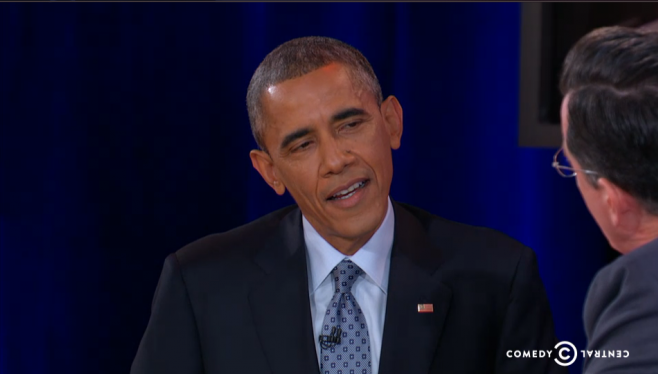In his appearance last week on The Colbert Report, President Obama restated his approach to the Keystone XL pipeline decision, a mindset that can only be described as confused.
The president summarized his strange dilemma as follows: “[Keystone] could create a couple of thousand potential jobs in the initial construction of the pipeline, but we’ve got to measure that against whether or not it is going to contribute to an overall warming of the planet that could be disastrous.”
But this thinking hinges on three key — and false — assumptions.
First, that whatever carbon dioxide or pollution (note that I did not say “or other pollution” since CO2 is plant food, not pollution) would be generated in the building or operation of Keystone will not be generated in whatever other method ends up being used to transport oil from Canada through the United States.
Second, the usual climate alarmist assumptions, namely that humans are having a substantial impact on the climate and that a warming of the planet is likely to be harmful.
Third, and most important, the implicit assumption that climate change — even if you believe the alarmists’ claims — is the only risk worth considering.
Regarding ignoring the theoretical climate impacts of alternatives to Keystone: Opponents of Keystone (or more precisely of the section of Keystone that connects Alberta, Canada, to Nebraska) seem to believe that if we don’t allow a way to transport Canadian oil here, our neighbors to the north will then just leave it in the ground. This is, of course, preposterous. Since every potential alternative form of transportation, whether via truck, ship, train, or any combination likely creates more pollution than a pipeline, particularly if transported by people other than Americans or Canadians, and since any pipeline built by American and Canadian companies is likely to be constructed more environmentally sensitively than pipelines built overseas, a concern over carbon or pollution argues strongly for, not against, building Keystone XL.
And then there is Obama’s implicit assumption that the overriding risk to be considered is the climate. Environmentalists who claim to care deeply about the planet should be far more concerned about real, demonstrable risk than about the unproven (and increasingly disproven) hypothesis of human-caused climate change. One such demonstrable risk is that of oil spills and terrible accidents within other forms of oil transportation, particularly the trucks and trains that will continue, in the absence of Keystone XL, to carry the oil through the United States.
Even the Obama administration’s State Department recognizes this: “The increased number of unit trains… would affect communities through elevated air emissions and noise from the trains, and increased risk of spills and collisions.”
This is not to say that one form of transportation is utterly unsafe while another is utterly safe: Spill statistics are a close call: pipelines spill at lower frequencies but higher volumes than rail transportation of oil. Similarly, trains have more accidents but fewer fires and explosions. (There are similar comparisons made for transporting the oil by ship: very few incidents but potentially many barrels may spill in an incident.)
One of the most important statistics should be rates of injury and death, and on this score pipelines fare very well compared to trains: Overall, State concludes that transporting the Canadian oil by rail would add 49 injuries and 6 fatalities each year as compared to one injury and no deaths if the oil goes through Keystone XL.
In fact, State says that “Annual baseline injuries and fatalities without an increase in transport volume from rail transport or pipeline are projected to be approximately 712 injuries and 94 fatalities compared to three injuries and two fatalities for petroleum pipeline.” This argues not only for using Keystone to transport the new Canadian oil production but also to use it, and other new pipelines, to substitute for current rail transportation of oil.
A final point: Some argue against Keystone because they say the oil will make its way to the Gulf Coast to be refined and then exported rather than being used in the United States. Radical environmentalists go so far as to conclude that Keystone is therefore a “scam being played on the American people.”
Exporting American oil would require Congress or the president to lift the current export ban. I expect the upcoming Republican-controlled Congress to send such a measure to the president’s desk in short order. Former Obama chief economic adviser Larry Summerssupports lifting the ban but one of the president’s closest current counselors, John Podesta, has not made clear his position. Podesta’s prior job was running the Center for American Progress whose energy “expert,” Dan Weiss (a card-carrying member of the Cult of Algore and a man who seems proud of his comprehensive economic ignorance), is against lifting the ban.
Not surprisingly, socialist senators and their friends in the environmental fear-mongering industry don’t understand even basic economics. Oil is traded worldwide with the two major benchmarks being the U.S.’s West Texas Intermediate (WTI) and Europe’s Brent Crude. The prices track each other closely, though in recent years American oil has been less expensive because of large supply in the Midwest.
If we export Canada’s increased oil production to the rest of the world, we will lower oil prices in the aggregate, including here in the United States. Yes, there may be regional effects of pipelines and yes, it is possible that Midwestern oil and gas prices would lose their current discount relative to the rest of the United States, but overall the United States would have lower energy prices. And that’s what matters.
Domestically, the more we lower oil prices, the lower Americans’ cost of living is and the more money we have to spend on things we want to buy rather than things we have to buy, such as gasoline and heating oil. Internationally, the more we can lower world oil prices, the more we prevent our enemies like Vladimir Putin and the radicals running Venezuela from being able to fund adventurist, militaristic, and anti-Western foreign policies, and the more we prevent our so-called friends in the Middle East from being able to use American, European, and Chinese money to support Wahhabism, Hamas, ISIS, and CAIR, and others who want us dead or destroyed as a free society.
Given all these factors, President Obama’s suggested calculus — balancing “a couple thousand jobs” versus what he perceives as the risks involved in building and operating the Keystone XL pipeline — is preposterous: The jobs it creates are a nice bonus (and are what the many labor unions who support the project care about), but they are not the most important benefit of the project.
Keystone XL won’t increase pollution but it will save American lives and hurt our enemies. Those who oppose it should be forced to justify their opposition in that context.





